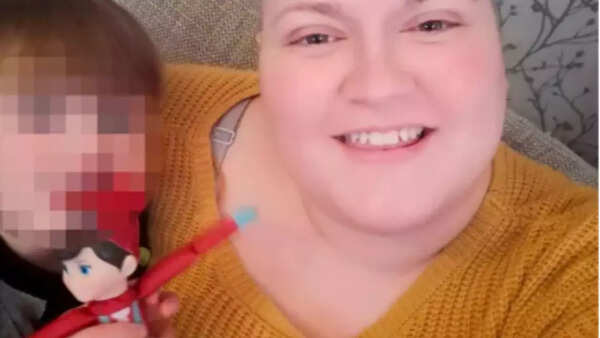A 28-year-old mother from Leeds, Georgia Gardiner, is facing a grim prognosis after her stomach cancer was initially mistaken for heartburn. After months of persistent symptoms and repeated visits to doctors, she received the devastating diagnosis of linitis plastica, a rare and aggressive form of stomach cancer, also known as "leather bottle stomach".

Georgia's ordeal began last summer when she started experiencing constant nausea, stomach cramps, and a significant loss of appetite. Doctors attributed her symptoms to acid reflux and prescribed antacids. However, her condition worsened rapidly. She lost a substantial amount of weight and struggled to keep food down. Despite seeking medical attention multiple times, her concerns were dismissed as indigestion or heartburn.
After persistent advocacy, Georgia was finally referred for specialized tests. An endoscopy revealed the horrifying truth: she had linitis plastica, which causes the stomach lining to thicken and the stomach to lose its function.
By the time of her diagnosis on June 13, 2024, the cancer had already spread to her lymph nodes and other organs. Doctors delivered the devastating news that her condition was terminal, estimating she had only 12 months to live. Treatment would focus on managing symptoms and improving her quality of life.
"I felt invincible. I never thought that I would develop cancer at 28. My world fell apart when I was informed that it is incurable," Georgia shared.

Georgia is now dedicated to cherishing the time she has left with her fiancé, Callum Scott, and their two-year-old son, Arlo. The couple has accelerated their wedding plans, understanding the urgency of their situation. Georgia is determined to create lasting memories with her loved ones.
“The thing that breaks me is how much I’ll miss in Arlo’s life. He gives my life purpose,” she said. Despite the difficult circumstances, she remains resolute in her determination to fight the cancer "in every way possible" for her son.

Georgia is now using her experience to encourage others to be proactive about their health and to advocate for themselves when seeking medical care.
"Had I been taken seriously sooner, perhaps we could have nipped it in the bud before it spread. I just want others to get it in time," she emphasized. Her message is clear: listen to your body, don't dismiss persistent symptoms, and don't hesitate to demand answers from medical professionals.
Linitis plastica is a rare and aggressive type of adenocarcinoma affecting the stomach lining. It is characterized by the stiffening and thickening of the stomach walls, often described as "leather bottle stomach." Due to its rapid progression and subtle early symptoms, it is often diagnosed at an advanced stage.
The symptoms of this rare form of stomach cancer can be vague and easily mistaken for other conditions. Common signs and symptoms include:
Unfortunately, the aggressive nature of linitis plastica makes it difficult to treat, particularly once it has spread beyond the stomach wall.
The exact cause of linitis plastica remains unknown. However, it is strongly associated with diffuse-type gastric adenocarcinoma. In some cases, genetic mutations, particularly in the CDH1 gene, have been implicated. This gene mutation is linked to hereditary diffuse gastric cancer (HDGC), which significantly increases the risk of developing linitis plastica.
Other potential contributing factors include:
These factors can contribute to the development and progression of this aggressive cancer.
Linitis plastica is notoriously difficult to cure due to several factors:
Newer articles
Older articles
 India Enters New Space Age as Astronaut Shukla Joins ISS Mission
India Enters New Space Age as Astronaut Shukla Joins ISS Mission
 X Cracks Down: Half a Million Indian Accounts Suspended for Policy Breaches
X Cracks Down: Half a Million Indian Accounts Suspended for Policy Breaches
 Google Unveils Strategy to Combat Misinformation, Boost Voter Access in India's 2024 Elections
Google Unveils Strategy to Combat Misinformation, Boost Voter Access in India's 2024 Elections
 Hair Oil vs. Hair Serum: Which is the Right Choice for Your Hair?
Alternatively:
Unlock Your Best Hair: Choosing Between Hair Oil and Serum for a Healthy Mane
Hair Oil vs. Hair Serum: Which is the Right Choice for Your Hair?
Alternatively:
Unlock Your Best Hair: Choosing Between Hair Oil and Serum for a Healthy Mane
 Bollywood's 'Swades' Anthem Joins Axiom-4 Mission: Indian Astronaut's Playlist Honors Heritage in Space
Bollywood's 'Swades' Anthem Joins Axiom-4 Mission: Indian Astronaut's Playlist Honors Heritage in Space
 Vijay Sethupathi Apologizes Amid Controversy Over Son's Film 'Phoenix'
Vijay Sethupathi Apologizes Amid Controversy Over Son's Film 'Phoenix'
 New York Assemblyman Zohran Mamdani's Style: 5 Lessons in Authenticity and Heritage
New York Assemblyman Zohran Mamdani's Style: 5 Lessons in Authenticity and Heritage
 Colon Cancer: Don't Ignore These 5 Early Warning Signs
Colon Cancer: Don't Ignore These 5 Early Warning Signs
 TSMC Regains Top 10 Global Value Ranking Amid AI Boom
TSMC Regains Top 10 Global Value Ranking Amid AI Boom
 Android Users Urged to Update Devices Amid High-Severity Security Flaws: Government Issues Warning
Android Users Urged to Update Devices Amid High-Severity Security Flaws: Government Issues Warning